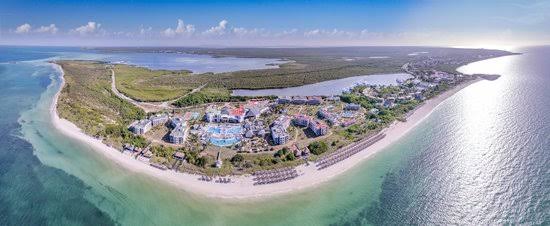
CAYO COCO, CUBA — Once known as a tranquil escape for sun-seekers and honeymooners, Cayo Beach on the northern coast of Cuba has found itself in the international spotlight for all the wrong reasons. In a startling series of events unfolding over the last two months, tourists and locals alike have been left reeling as unexplained occurrences, criminal activity, and questionable local responses shake the foundations of this Caribbean paradise.
A String of Alarming Events
Cayo Coco, part of the Jardines del Rey archipelago, is famed for its crystal-clear waters, powdery white sands, and luxurious all-inclusive resorts. However, behind the postcard-perfect scenery, whispers of chaos have begun to surface.
The first major shock came in early March when a Canadian couple, vacationing at the upscale Playa Azul Resort, went missing after venturing out on a late-night beach walk. Their personal belongings were found abandoned near the shoreline. Authorities initially suggested they may have drowned, but no bodies were recovered, and their family insists they were experienced swimmers and cautious travelers.
Just a week later, an electrical fire erupted at the neighboring Mar Sol resort. Eyewitnesses reported seeing flames shoot from a faulty junction box in the kitchen, quickly spreading to the guest rooms above. Though no lives were lost, dozens of tourists were evacuated in panic, and several sustained injuries during the escape. Guests complained about the lack of emergency protocols and slow response from resort staff.
“It was like something out of a movie,” said Carla Jensen, a Norwegian tourist who had just arrived the day of the fire. “We were told nothing, no alarms went off—just smoke, screaming, and people running.”
Robberies and Vanishing Belongings
By mid-April, the situation had escalated further. Reports of petty theft turned into full-scale robberies. At least six tourists claimed they were held at knifepoint on the beachside trail connecting several resorts. In each case, the attackers were masked and spoke fluent Spanish, disappearing into the dense mangroves before security could respond.
Worse yet, several guests returning from excursions reported finding their hotel safes emptied and personal electronics missing, with no signs of forced entry. Resort managers have declined to comment, and investigations remain inconclusive.
“There’s an eerie sense that someone knows everything you’re doing here,” said James Tuttle, a British teacher vacationing with his wife and two children. “It’s not the Cuba we read about in the brochures.”
Mysterious Illnesses
Adding to the concern, dozens of travelers began reporting symptoms of a mysterious gastrointestinal illness after dining at various resort restaurants. Though initially dismissed as food poisoning, many cases required hospitalization after dehydration and fever worsened. The origin of the illness remains unclear.
“I was sick for four days straight,” said Maria López, an American nurse from Miami. “We were told it was just bad shrimp, but we didn’t eat seafood. Something doesn’t add up.”
The Cuban Ministry of Health has not released an official statement, fueling speculation and concern across social media platforms. Many believe the outbreak is more serious than local officials are willing to admit.
Conspiracy or Coincidence?
While local authorities assure visitors that these are isolated incidents, some suspect a deeper issue at play. Online forums have erupted with theories ranging from organized crime to government cover-ups.
One viral Reddit thread, now with over 15,000 upvotes, speculates that Cayo Beach may be part of a growing underground trafficking route—a claim completely denied by Cuban officials but echoed by some local staff anonymously.
“Things started changing about a year ago,” said one resort employee, who spoke under the condition of anonymity. “Strangers hanging around after dark, police showing up quietly, and then pretending nothing happened.”
Another troubling theory links the incidents to strained diplomatic relations. In 2021 and 2022, several U.S. diplomats stationed in Havana reported unexplained health symptoms, often dubbed “Havana Syndrome.” Some wonder if the mysterious illnesses at Cayo Beach could be connected, but no evidence has supported this theory.
Tourist Industry in Crisis
As word spreads, cancellations have surged. Tour operators in Canada, the U.K., and Spain report a dramatic decline in bookings to Cuba’s resort areas, especially Cayo Coco and Cayo Guillermo. Some travel agencies have suspended promotions entirely, awaiting clarity.
“We had over 200 cancellations last week alone,” said an operator at HavanaGetaway, a leading European-Cuban travel agency. “Clients are nervous, and we don’t have answers.”
This downturn hits hard for locals, many of whom rely on tourism for their livelihoods. Resort workers, beach vendors, and drivers are feeling the pressure as income dries up and uncertainty grows.
Official Response
Cuban tourism officials insist the island remains safe for visitors and claim foreign media is exaggerating isolated events. In a recent press release, the Cuban Ministry of Tourism stated:
“We regret the recent incidents reported and are working closely with hotel operators and local law enforcement to ensure the safety of all guests. Cayo Beach remains one of the safest destinations in the Caribbean.”
But critics argue the government’s reassurances ring hollow without visible improvements in security and transparency.
What Tourists Can Do
Travel experts advise extra precautions for those planning to visit Cuba in the coming months:
Stay in groups when leaving resort areas.
Avoid isolated beaches at night.
Double-check travel insurance coverage for emergencies.
Use secure bags and avoid bringing valuables to the beach.
Monitor local news and forums for updated travel warnings.
Travelers are also encouraged to report any suspicious activity directly to both hotel security and their respective embassies or consulates.
A Paradise in Peril?
For now, the once-idyllic Cayo Beach stands at a crossroads. Will it recover its reputation as a peaceful Caribbean getaway, or will it become a cautionary tale of how paradise can be lost?
One thing is certain: visitors to this turquoise gem should pack more than just sunscreen—they may need a heightened sense of caution, too.